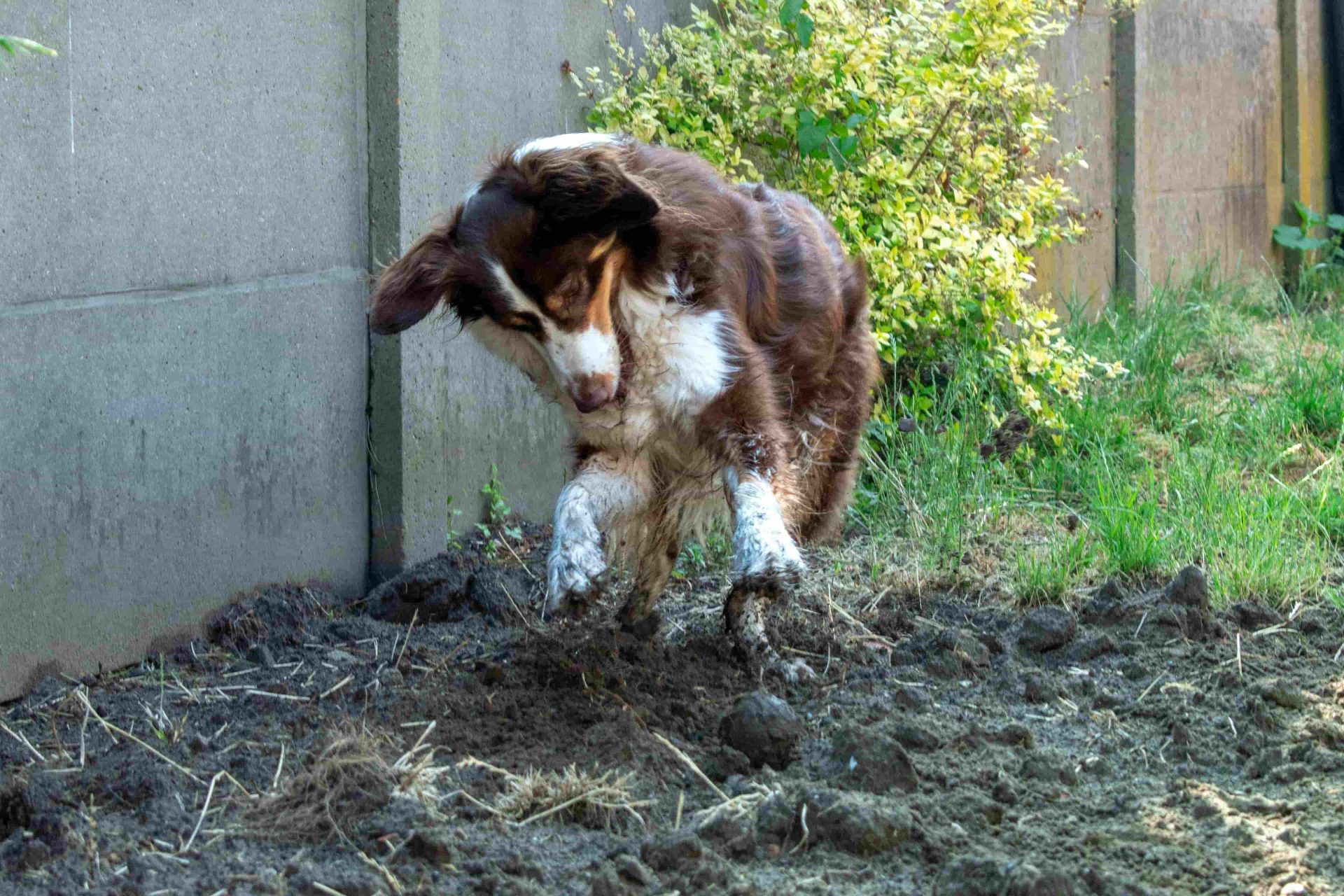Is your dog turning your yard into a battlefield of holes? You’re not alone. You will get solution on How Do You Stop a Dog from Digging
Many dog owners face the challenge of a digging dog, and it can be frustrating. But don’t worry; you can stop this behavior with the right approach. Understanding why your dog digs is the first step. Whether it’s boredom, anxiety, or simply a playful instinct, recognizing the root cause is key to finding a solution.
You’ll discover practical tips and strategies to curb your dog’s digging habits. From providing mental stimulation to creating designated digging areas, you’ll learn how to redirect your furry friend’s energy in positive ways. If you’re ready to reclaim your yard and keep your dog happy, keep reading. Your solution is just a few steps away!
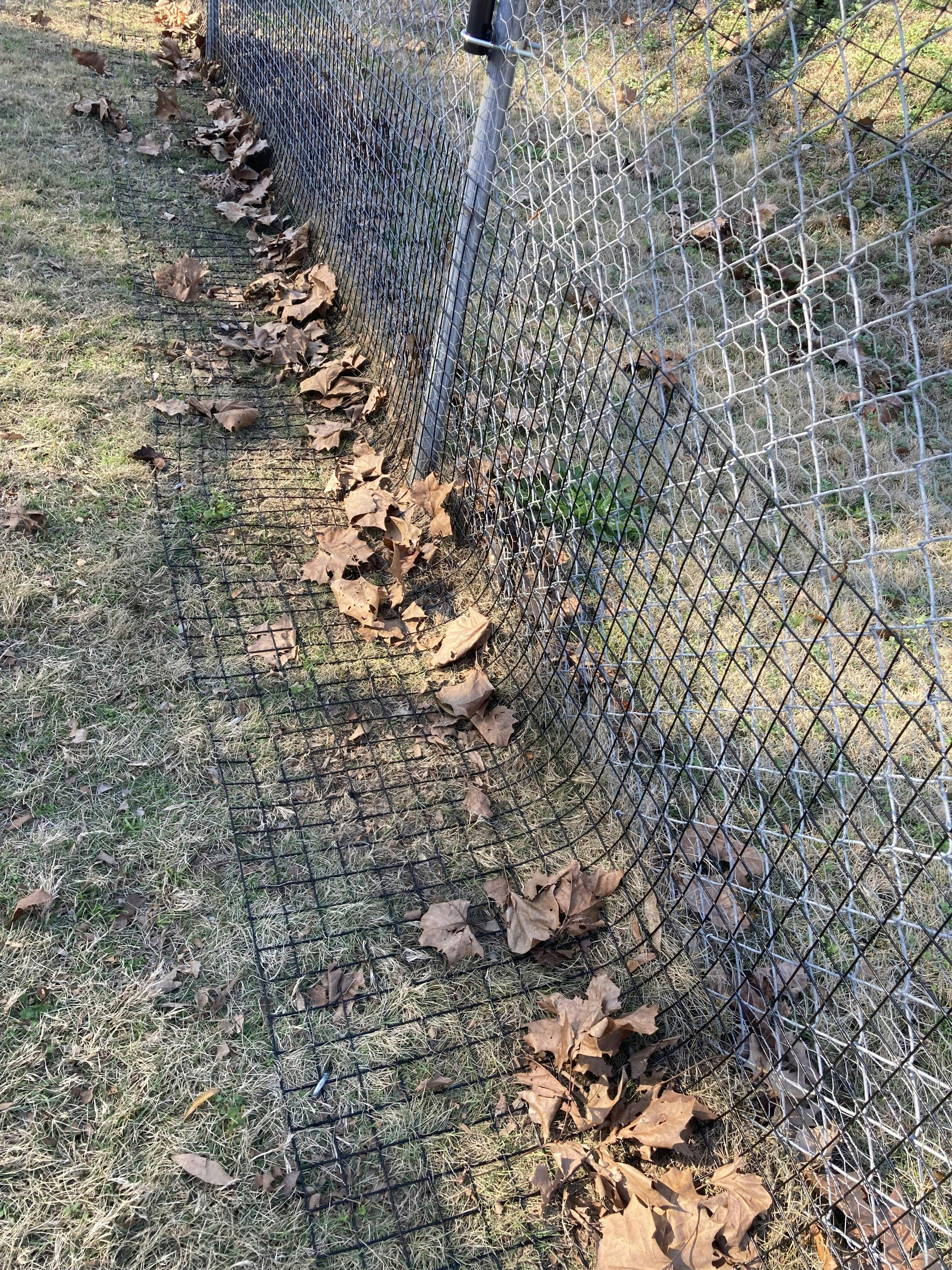
Credit: www.dogproofer.com
Reasons Dogs Dig
Understanding why dogs dig is crucial for addressing this behavior effectively. Digging can stem from various motivations, and recognizing these reasons can guide you in finding the right solution. Let’s explore the most common reasons dogs dig and how you can tackle them.
Hunger Or Boredom
If your dog is not getting enough physical exercise or mental stimulation, they may dig out of boredom. Dogs are active creatures that thrive on interaction and activity. A lack of engagement can lead them to create their own fun, often through digging.
Have you noticed your dog digging after a long day of being alone? This behavior often signals that they need more playtime or a challenge. Incorporating regular walks and play sessions can help curb this behavior.
Instinctual Behavior
Digging can also be a natural instinct for many breeds. Terriers, for instance, were bred to hunt and burrow. This instinct may lead them to dig in your yard or garden.
Consider providing your dog with a designated digging area. This allows them to indulge their instincts without damaging your landscaping. A simple sandbox or a specific spot in the yard can satisfy their digging desires.
Comfort And Security
Dogs may dig to create a comfortable spot or to find shelter from the elements. This behavior is especially common during hot or cold weather. They instinctively seek a cool or warm place to relax.
Assess your dog’s environment. Ensure they have a cozy, shaded area in the yard and access to fresh water. A comfortable space can reduce the urge to dig.
Attention-seeking Behavior
Sometimes, digging is a way for dogs to get your attention. If digging results in you coming outside to scold them, they may associate the behavior with getting noticed. This can create a cycle of unwanted behavior.
Redirect your dog’s energy by rewarding them for positive behaviors. Offer praise or treats when they engage in appropriate activities. This will help them understand that digging isn’t the best way to get your attention.
Stress And Anxiety
Stress and anxiety can lead to digging as a coping mechanism. Changes in your home, like moving or new pets, can trigger this behavior. Dogs may dig to relieve their stress or anxiety.
Look for signs of anxiety in your dog. If you suspect this is the cause, consider consulting with a veterinarian or a dog trainer. They can provide strategies to help your dog feel more secure.
Understanding these reasons can empower you to address your dog’s digging behavior effectively. By identifying the root cause, you can implement practical solutions that cater to your dog’s needs. Have you noticed any specific triggers for your dog’s digging? Taking the time to observe and respond can lead to a happier, more balanced pet.
Physical And Mental Stimulation
Dogs need both physical and mental stimulation to stay happy. Boredom often leads to unwanted behaviors like digging. Providing activities keeps your dog engaged. This reduces their urge to dig in the yard.
Physical Exercise
Regular walks are essential for your dog. Aim for at least 30 minutes each day. You can also play fetch or tug-of-war. These games provide great exercise and fun.
Consider taking your dog to a dog park. Here, they can run and play with other dogs. Social interactions help burn off energy. A tired dog is less likely to dig.
Mental Enrichment
Mental stimulation is just as important as physical activity. Puzzle toys can challenge your dog’s mind. Fill them with treats for extra motivation.
Training sessions also provide mental exercise. Teach your dog new tricks or commands. This keeps their brain active and engaged.
Interactive Games
Interactive games help keep your dog busy. Hide and seek is a fun option. You can hide treats around the house or yard.
Consider using scent games. Dogs love to sniff and search for hidden items. This taps into their natural instincts and keeps them occupied.
Creating A Digging Zone
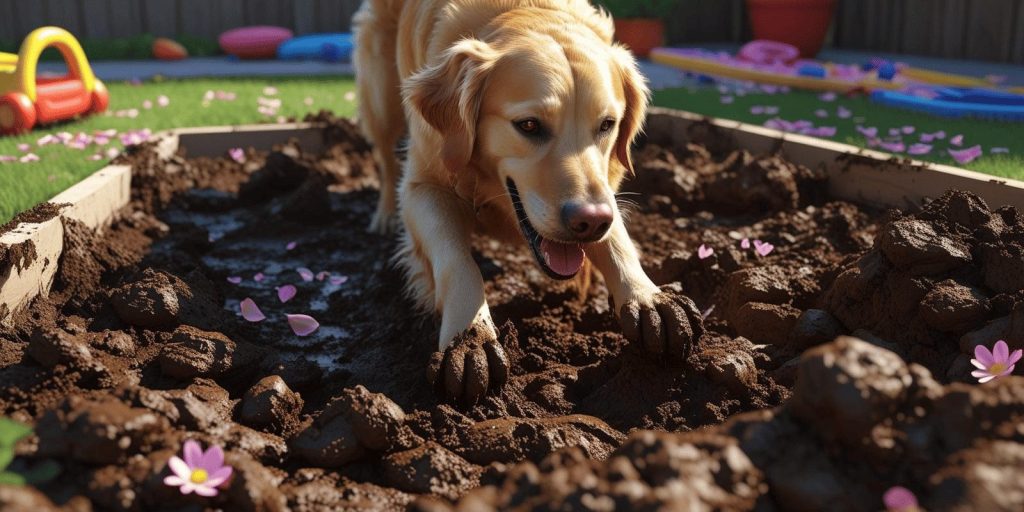
Creating a digging zone can help control your dog’s behavior. It gives them a space to dig freely. This method redirects their energy. It can prevent damage to your yard.
Here are some steps to create an effective digging zone.
Choose The Right Location
Select a spot in your yard. Look for an area away from plants. Make sure it’s a safe place for digging.
Designate A Digging Area
Use a clear boundary for the digging zone. You can use logs or fencing. This helps your dog understand where they can dig.
Fill The Zone With Loose Soil
Use soft soil or sand in the digging area. Dogs enjoy digging in loose material. This makes the zone more appealing to them.
Add Fun Toys Or Treats
Place toys or treats in the digging zone. This encourages your dog to dig there. It makes the area more exciting and rewarding.
Supervise Your Dog
Watch your dog while they dig. This helps guide them to the digging zone. Praise them when they dig in the right spot.
Redirect Unwanted Digging
If your dog digs elsewhere, gently redirect them. Lead them to the designated digging area. Use positive reinforcement to encourage them.
Creating a digging zone helps both you and your dog. It offers a healthy outlet for their digging instincts.
Using Positive Reinforcement
Using positive reinforcement can effectively stop a dog from digging. Rewarding your dog for digging in the right spots encourages better behavior. Be consistent with praise and treats to reinforce this learning.
Using positive reinforcement is one of the most effective ways to stop your dog from digging. This approach focuses on encouraging good behavior rather than punishing unwanted actions. By rewarding your dog for staying away from certain areas or engaging in appropriate activities, you can create a more enjoyable training experience for both of you.
Understand Your Dog’s Motivation
Before you start using positive reinforcement, identify why your dog digs. Dogs may dig out of boredom, anxiety, or to explore their environment. Understanding your dog’s motivation helps you tailor your rewards effectively. Ask yourself: Is your dog digging because they are anxious when left alone? Or is it simply out of boredom? Addressing these underlying issues can make a significant difference.
Use Treats Effectively
Treats are a powerful tool for positive reinforcement. When your dog avoids digging, immediately reward them with a treat. This creates a strong association between good behavior and a positive outcome. You could try a few different treats to see which ones excite your dog the most. Keep the treats small and healthy to prevent overindulgence.
Incorporate Praise And Playtime
In addition to treats, verbal praise and playtime can reinforce good behavior. When your dog chooses not to dig, enthusiastically say “Good dog!” or “Yes!” This acknowledgment can motivate them to repeat the behavior. Consider incorporating a fun game after your dog behaves well. Toss a ball or engage in a tug-of-war session. This not only reinforces the behavior but also strengthens your bond.
Redirect Their Energy
Sometimes, dogs dig out of boredom or excess energy. Redirect this behavior by providing engaging alternatives. Designate a digging area in your yard where it’s acceptable for them to dig. Encourage them to dig there by burying toys or treats. This not only satisfies their digging instinct but also keeps your yard intact.
Be Consistent And Patient
Consistency is key to successful training. Make sure everyone in your household follows the same rules and rewards. This prevents confusion and helps your dog understand what is expected. Training takes time, so be patient. Celebrate small victories along the way. Your dog will learn over time what behaviors are desirable. Using positive reinforcement not only helps stop unwanted digging but also fosters a trusting and loving relationship between you and your dog. Have you noticed a change in your dog’s behavior since you started rewarding good actions?
Deterring With Scents
Deterring your dog from digging can sometimes feel like an uphill battle. One effective method is using scents that dogs naturally dislike. By introducing certain aromas into the digging area, you can discourage your furry friend from turning your yard into a construction site.
Understanding Canine Sensitivity To Scents
Dogs have an incredible sense of smell, often far more sensitive than ours. This means that they can be deterred by scents that we might not even notice. Using strong odors can be a game changer in curbing unwanted digging behavior.
Common Scents That Deter Dogs
- Citrus:Many dogs dislike the smell of citrus fruits like oranges and lemons. You can use citrus peels or essential oils in the area where your dog digs.
- Vinegar:The strong scent of vinegar can make your dog think twice about digging. Mix equal parts of water and vinegar, and spray it around the area.
- Essential Oils:Oils like lavender, eucalyptus, or peppermint can also repel dogs. Just be cautious, as some essential oils can be toxic to pets if used in large amounts.
How To Apply These Scents Effectively
Simply placing a citrus peel in the dirt may not be enough. You need to consistently refresh these scents to maintain their effectiveness. Spraying a vinegar solution weekly can help keep your dog away from specific areas.
Consider creating a scent barrier. For instance, if your dog has a favorite digging spot, surround it with a mix of scents that they dislike. This will make the area less appealing.
Combining Scents With Other Training Techniques
While scents can deter digging, combining them with positive reinforcement works wonders. When your dog avoids digging in the targeted area, reward them with treats or praise. This reinforces good behavior and creates a more pleasant environment for both of you.
Have you ever noticed how your dog reacts to certain smells? Observing their behavior can provide valuable insights. You might discover a scent that works wonders for your dog’s unique personality.
Using scents is just one piece of the puzzle. By pairing it with training, exercise, and mental stimulation, you can effectively manage your dog’s digging habits. Are you ready to give it a try?
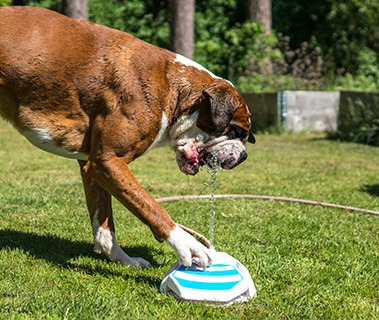
Credit: doggoneamazing.com
Installing Physical Barriers
Stopping a dog from digging can be challenging. Installing physical barriers offers a straightforward solution. These barriers create a clear boundary for your pet. They help protect your garden and yard from unwanted holes.
Fencing Options
Fencing is a popular choice for many dog owners. A solid fence prevents dogs from accessing certain areas. Ensure the fence is tall enough. Some dogs can jump high. Digging under the fence is also a concern. Bury the bottom of the fence a few inches underground. This makes it harder for dogs to dig underneath.
Garden Borders
Using garden borders can help, too. These physical barriers define garden space. They can be made of wood, stone, or metal. Choose materials that are sturdy and durable. Make sure they are tall enough to deter digging. Dogs are less likely to dig in clearly defined areas.
Digging Pits
A designated digging pit can redirect your dog’s energy. Create a specific area for your dog to dig. Fill it with sand or loose soil. Encourage your dog to dig there. This gives them an acceptable space to dig without destroying your yard.
Ground Covers
Using ground covers can also help reduce digging. Dense plants make it harder for dogs to dig. Choose plants that are tough and resilient. This can protect your garden while keeping it attractive. Regular maintenance will ensure the ground cover remains effective.
Motion-activated Devices
Consider using motion-activated devices. These can deter dogs from digging in certain areas. Sprinklers or noise devices can startle them. This can discourage unwanted behavior. Position them near vulnerable areas of your yard.
Supervision Strategies
Effective supervision strategies can help prevent dogs from digging. Providing regular exercise and mental stimulation keeps them engaged. Designating specific digging areas can redirect their behavior while using deterrents may discourage unwanted digging. Consistent monitoring also plays a crucial role in managing this behavior.
When it comes to managing your dog’s digging habits, supervision is essential. By keeping a close eye on your furry friend, you can intervene before digging becomes a habit. You can also redirect their energy into more constructive activities. Here are some effective supervision strategies that can help you maintain control while ensuring your dog is happy and healthy.
Establish A Routine
Creating a consistent schedule can greatly reduce the likelihood of your dog digging. – Set specific times for walks, play, and bathroom breaks. – This structure gives your dog a sense of security. – A busy schedule leaves less idle time for mischief. You might find that when your dog has enough physical and mental stimulation, they are less inclined to dig.
Use A Leash For Supervised Time Outside
When your dog is in the yard, consider using a leash to keep them close. – This allows you to monitor their behavior closely. – You can correct unwanted actions immediately. – Positive reinforcement for good behavior can help teach them what is acceptable. A few weeks of leash training can make a huge difference.
Create A Designated Digging Zone
Sometimes, dogs dig out of pure instinct. – Designate a specific area in your yard where digging is allowed. – Use toys or buried treats to encourage exploration in this space. This not only satisfies their natural digging instincts but also keeps the rest of your yard intact.
Engage In Interactive Play
Make playtime an opportunity to bond with your dog. – Play fetch or tug-of-war to keep them engaged. – Puzzle toys can also provide mental stimulation. When your dog is mentally and physically tired, they are less likely to dig. Supervision is key in breaking the digging habit. Think about your dog’s daily routine—are they getting enough stimulation? What strategies have you tried? The answers might help you find the right balance for your furry friend.
Environmental Enrichment
Environmental enrichment helps keep dogs mentally and physically stimulated. A bored dog is more likely to dig. Providing a variety of activities can reduce this behavior. Dogs need to explore, play, and engage with their surroundings.
Creating a rich environment encourages good habits. It promotes healthy behaviors and strengthens the bond between you and your dog. Here are some effective ways to enhance your dog’s environment.
Interactive Toys
Interactive toys can keep your dog busy for hours. Toys that dispense treats are a great choice. They challenge your dog and make playtime fun. Rotate toys regularly to maintain interest.
Outdoor Exploration
Take your dog on different trails and parks. New smells and sights stimulate their senses. Let them explore safely on a leash. This helps satisfy their curiosity and reduces digging.
Training Sessions
Short training sessions can be very effective. Teach your dog new tricks or commands. Use positive reinforcement to encourage them. This not only enriches their mind but also strengthens your bond.
Designated Digging Areas
Provide a specific area for digging. Fill it with sand or loose soil. Encourage your dog to dig there during playtime. This gives them an outlet for their natural digging instinct.
Social Interaction
Arrange playdates with other dogs. Socializing can reduce boredom and promote healthy behaviors. Dogs enjoy interacting with their peers. It keeps them engaged and happy.
Addressing Anxiety Or Boredom
Dogs dig for various reasons, including anxiety and boredom. To curb this behavior, provide plenty of exercise and mental stimulation. Creating a designated digging area can also help, giving your dog an outlet for their natural instincts.
Understanding The Causes Of Anxiety
Dogs dig for many reasons. One common reason is anxiety. Stress can make them feel unsafe. They may dig to escape or seek comfort. Understanding this behavior is key to stopping it.
Provide A Safe Space
Creating a safe area helps reduce anxiety. This space should be quiet and comfortable. Use soft bedding and familiar toys. Your dog will feel more secure here.
Increase Physical Activity
Regular exercise can ease anxiety. Take your dog for daily walks. Play fetch or tug-of-war. These activities burn off energy and reduce stress. A tired dog is less likely to dig.
Engage Their Mind
Mental stimulation is just as important. Puzzle toys can keep your dog busy. Teach new tricks or commands. This keeps their mind active and distracted from digging.
Establish A Routine
Dogs thrive on routine. Set a consistent schedule for feeding, walks, and playtime. A predictable environment can help reduce anxiety.
Use Positive Reinforcement
Encourage good behavior with rewards. When your dog plays instead of digging, praise them. Treats or affection can reinforce this behavior. Positive reinforcement builds trust.
Consult A Professional
If anxiety persists, consider professional help. A trainer or behaviorist can assess your dog. They can provide tailored strategies to manage anxiety. This may help prevent digging.
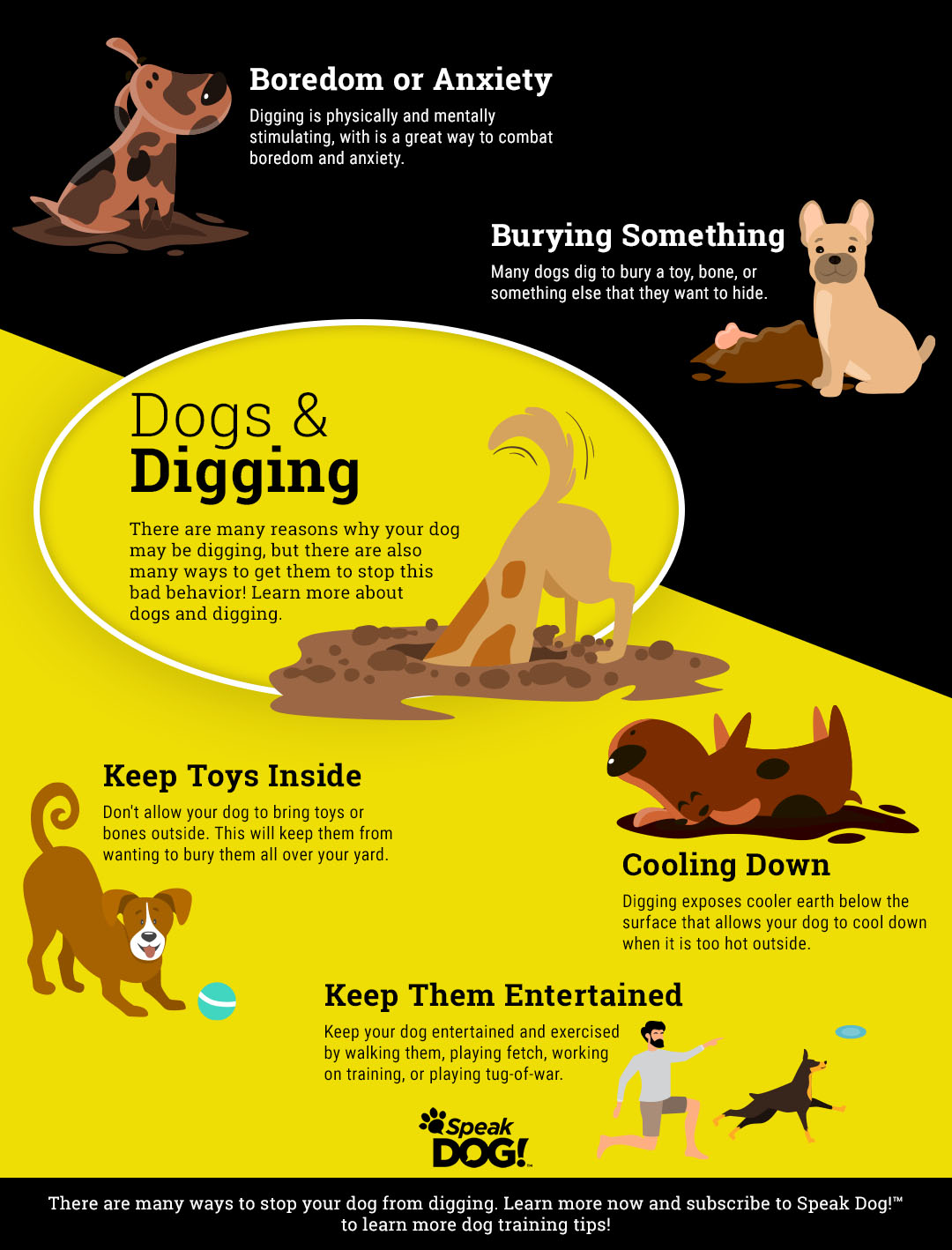
Credit: speakdog.com
Professional Training Support
Professional training support can help stop your dog from digging. Trainers know different methods to address this behavior. They can provide tailored advice for your dog’s needs.
Choosing a professional trainer offers several advantages. Trainers have experience with various dog breeds. They understand the reasons behind digging. This knowledge helps them create effective strategies.
Finding The Right Trainer
Search for trainers with good reviews. Look for those who specialize in behavioral issues. A positive approach is important. Ensure the trainer uses humane methods.
Ask for recommendations from friends or veterinarians. Many trainers offer consultations. This can help you decide if they are a good fit.
Training Techniques
Trainers often use positive reinforcement. This means rewarding good behavior. Treats and praise encourage your dog to stop digging.
Some trainers teach commands to redirect your dog. Commands like “leave it” or “come” can be useful. These commands give your dog clear guidance.
Group Classes
Group classes can provide socialization. They also teach dogs to follow commands in a fun setting. These classes often cover digging behavior.
Being around other dogs can motivate your pet. Group classes create a structured environment for learning.
Ongoing Support
Professional trainers often offer ongoing support. This can be through follow-up sessions or phone consultations. Regular check-ins help ensure progress.
Staying connected with a trainer can help you stay on track. You can share successes and challenges along the way.
Frequently Asked Questions
How Do I Stop My Dog From Digging Holes?
To stop your dog from digging holes, provide ample exercise and mental stimulation. Create a designated digging area for them. Use positive reinforcement for good behavior and consider deterrents like motion-activated sprinklers. Supervise them consistently to prevent unwanted digging.
Do Coffee Grounds Stop Dogs From Digging?
Coffee grounds may deter some dogs from digging due to their strong smell. However, not all dogs dislike the scent, and some may even be attracted to it. Consider using other methods alongside coffee grounds for effective results in preventing digging behavior.
What Is A Natural Deterrent For Digging Dogs?
Coffee grounds serve as a natural deterrent for digging dogs due to their strong smell. Many dogs dislike this scent, making it less likely for them to dig in treated areas. Other options include citrus peels, vinegar, and certain essential oils, which dogs often avoid.
Do Dogs Grow Out Of Digging?
Dogs may not completely grow out of digging, but with proper training and mental stimulation, the behavior can be reduced. Factors like boredom, anxiety, or instinct often drive digging. Addressing these causes helps manage the habit effectively. Consistent reinforcement and supervision are key to success.
How Can I Stop My Dog From Digging?
Provide more exercise and mental stimulation. A tired dog is less likely to dig.
Why Does My Dog Dig Holes In The Yard?
Dogs dig for various reasons, including boredom, anxiety, or hunting instincts.
Are Certain Breeds More Prone To Digging?
Yes, some breeds, like terriers and beagles, are natural diggers.
Can Training Help Stop My Dog From Digging?
Yes, training with positive reinforcement can reduce digging behavior effectively.
What Are Some Safe Deterrents For Digging?
Try using citrus peels, vinegar, or coffee grounds to deter digging.
Should I Let My Dog Dig In Certain Areas?
Yes, providing a designated digging area can satisfy their digging instinct.
Conclusion
Stopping a dog from digging takes time and patience. Use positive reinforcement to encourage better behavior. Provide plenty of exercise to keep them tired. Create a designated digging area for your dog. Supervise them to prevent unwanted digging. Understand their needs to address the root cause.
With consistency, your dog can learn new habits. Enjoy a peaceful yard without holes. A happy dog leads to a happy home.
Credits: Image by Freepik (https://www.freepik.com)

